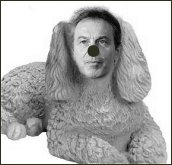
Tony Blair announced that he would step down on 27 June and finally transfer power to, presumably, the rather anxious Gordon Brown, who has been jumping up and down like an eight year old needing the bathroom for about the last four years as Tony clings to power.
Much of the commentary (for an example, see here) makes reference to Blair being "Bush's poodle". But perhaps he's not, or at least, not out of the ordinary. Post WWII history has shown that, when on the world stage since the disaster of the Suez Crisis, British PM's have traditionally chosen to influence American foreign policy by using their position as a trusted ally to nuance the Superpower's action in the direction of Britain's national interest: Two of the most "special relationships" include Harold Macmillan leaning on JFK to get nuclear missile defense of the UK and Europe, and Margaret Thatcher's heavy influence on Ronald Reagan.
Using this historical precedent, if Blair had independently concluded that invading Iraq was also in the UK's national interest, then he had every reason to support the invasion in 2003. And, more importantly, his influence was heavily present through the entire process, right up to the last days before the invasion when he forced Bush to take his case for war back to the UN for a second resolution.
Let's not jump to conclusions because Blair chose to commit troops to Iraq -- he did so because he thought it was in the UK's national interest, used Britain's historically most successful foreign policy mechanism to achieve his aims, and steered Bush in the direction of multilateralism (even though it was a relatively futile effort).
****
Getting into musical recommendations, check out Wilco's new release Sky Blue Sky... Half way through the first listen, it's a different, more straightforward record, but still up to the high standards of "Yankee Hotel Foxtrot" and "A Ghost is Born."

No comments:
Post a Comment